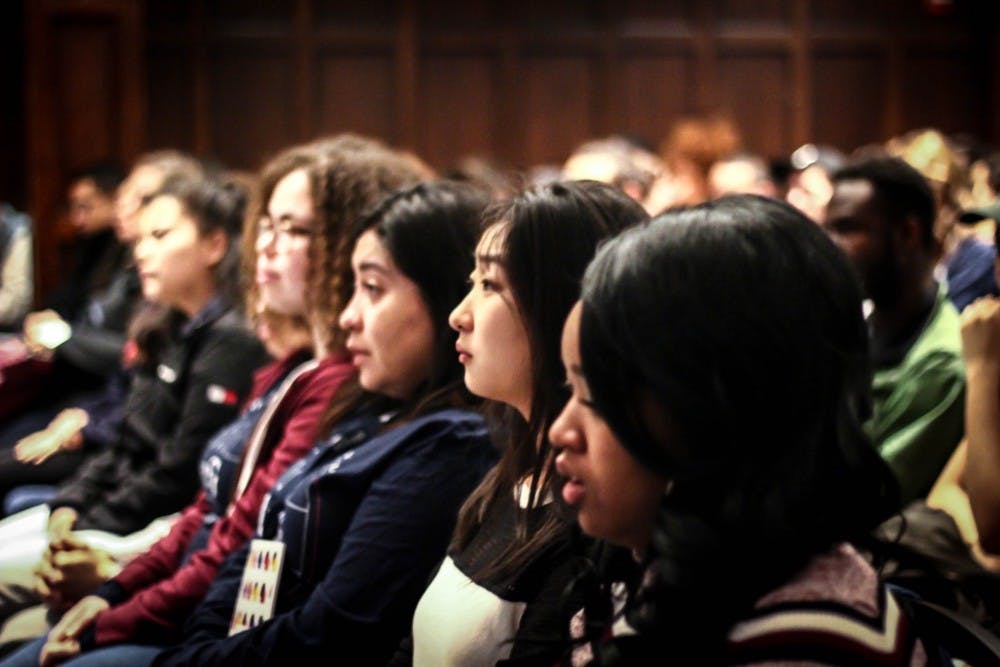Penn First, Penn’s largest first-generation, low-income student group voted against signing a letter denouncing legacy-based admissions policies while Seven|Eight, Penn's FGLI group for Asian Americans made the decision to sign it.
Members within both organizations diverge over the merits of the letter and the implications of endorsing it.
FGLI organizations at 12 other top-tier universities, including the Harvard Legacy Project, Yale Students Unite Now, Princeton Hidden Minority Council, and the Socioeconomic Diversity Alliance at the University of Chicago signed the letter.
Penn First voted on the decision late November, but the letter was only publicly released on Feb. 14.
The topic of legacy admissions is particularly relevant at Penn, where 16 percent of undergraduate students are considered legacy students. In 2017, The New York Times published an interactive data set that revealed 71 percent of Penn students came from families that are financially in the top 20 percent, while only 3.3 percent came from the bottom 20 percent.
Penn Admissions Office spokesperson Kathryn Bezella wrote in a written statement that they became aware of the letter when it was released, "but haven’t yet had time to respond given that we’re in the height of our admissions selection process."
The letter entitled “#FullDisclosure Letter” is a google document created by EdMobilizer Coalition that calls for colleges to “reevalute the purpose behind as well as the extent to which legacy preferences play a role in the college admissions process.”

RELATED:
As 1vyG wraps up the final day, students discuss practical ways to apply what they learned
First-generation low-income students say Penn’s job resources fall short
"At this time, Penn First does not have a comment to share regarding this topic. We realize this is a contentious topic with various valid points in opposition and support of legacy admissions, and we do not wish to ignore or isolate students that may not share the same views as board members of Penn First," the organization wrote in an emailed statement to The Daily Pennsylvanian.
College junior and Secretary of Penn First Lyndsi Burcham said she supported the decision not to sign and that, to her, it seemed like the wrong move for the FGLI community at Penn to sign the #FullDisclosure letter.
Burcham said she had two main concerns with the #FullDisclosure letter. First, she worried that eliminating legacy consideration might lead to an admission system that is completely merit-based, which could potentially be harmful to the admissions of FGLI students.
Burcham also mentioned that there is value to legacy policies, even for FGLI students.
"Why would I have gone through all of this and made the step to change the position of my family within the socioeconomic ladder if my kids won’t get to benefit from this someday,” Burcham said. “At some point somebody did a lot of work to get your family to where it’s at.”
Unlike Penn First, Seven|Eight did sign the letter. College senior David Thai, one of the founders of Seven|Eight, said he decided to sign the letter on behalf of the club because they agree that legacy admissions hurt FGLI applicants.
“Legacy admissions hinders social mobility for students who don’t come from those types of background,” Thai said.

Student organizers of 1vyG, a conference held last month for FGLI students. (Photo from Wenting Sun)
As Penn First acknowledged, the issue of legacy admissions and the decision not to sign is a contentious one, and even members of Penn First and others in the FGLI community at Penn support the letter's written goals and disagree with Penn First's decision not to sign.
College junior Alexandra Tolhurst, an active member of Penn First and of Quest Scholars at Penn, said that while the administration has been working hard to enhance the lifestyles of FGLI students, they need to remove the “final barrier," referring to legacy admissions.
“We go to a school that is supposed to be a bastion in coming out and helping first generation students be the ones to break through — even our president is a first-generation student,” Tolhurst said. “But then the policy is allowing us to not make the number as high as it should be.”

College freshman Ricky Ayala, a member of Questbridge Scholars at Penn — a club of undergraduate students awarded the Questbridge scholarships — said he recognized every point in the letter to be valid.
Ayala also said that he wants to see more transparency in the way legacy admissions functions at Penn.
“It's a very interesting dynamic because you have complete polar opposites in terms of admissions, social standing, and wealth,” Ayala said. “Legacy students have the road paved for them. FGLI students — there’s like a dirt trail or something.”
The Atlantic and US News also reported on the letter when it was released, noting the shift of conversation in the admissions world from focusing on affirmative action policies to focusing on legacy-based policies.



